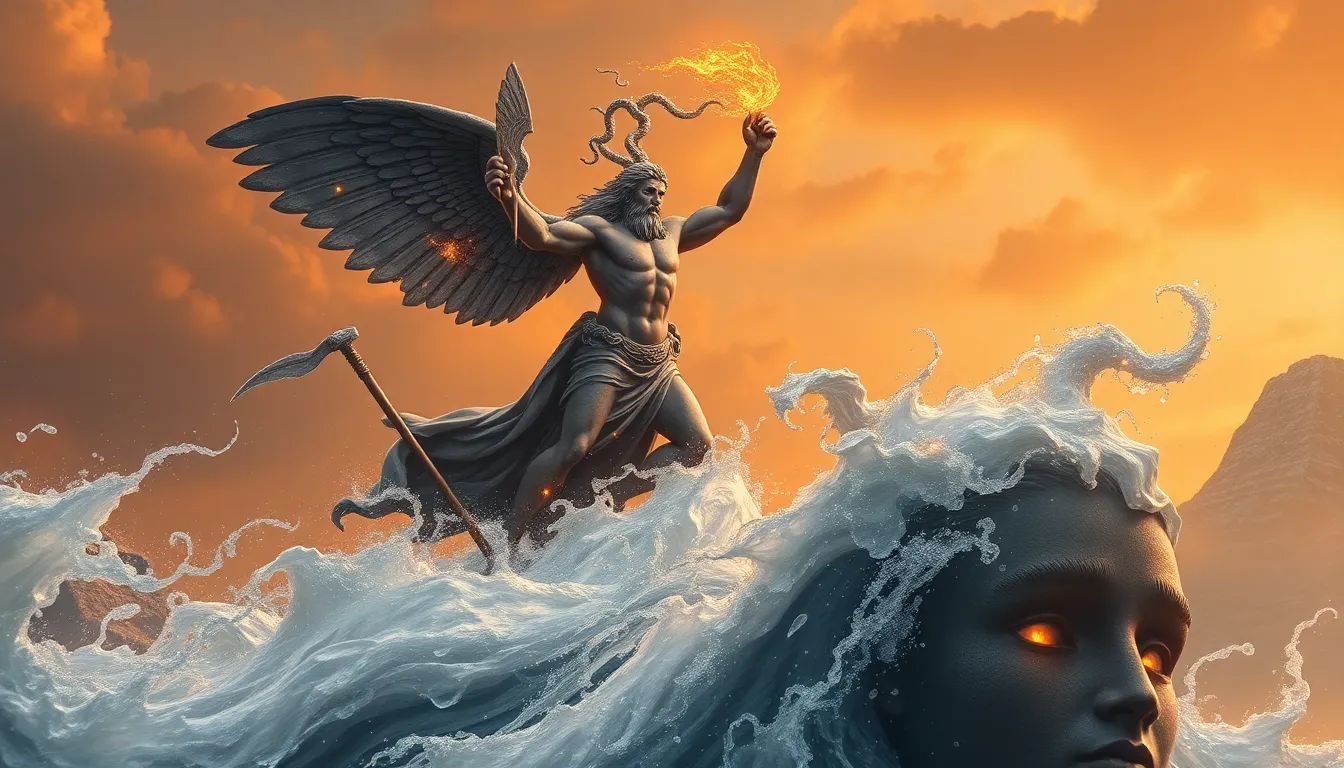The Unyielding Spirit of Prometheus: A Symbol of Resistance
I. Introduction
In Greek mythology, Prometheus is a titan known for his intelligence and his role as a champion of humanity. He is often portrayed as a figure of rebellion against the divine order, having defied Zeus, the king of the gods. Prometheus’s story embodies the struggle against oppression and the quest for enlightenment, making him a powerful symbol of resistance.
This article aims to explore the themes associated with Prometheus, focusing on his defiance and the broader implications of his actions for humanity. Through an analysis of his myth, we will uncover the profound lessons that Prometheus’s narrative offers in the context of resistance and the fight for freedom.
II. The Myth of Prometheus
Prometheus’s story is one of bold defiance. He is best known for stealing fire from Olympus and giving it to humanity. This act of rebellion against Zeus was not merely an act of theft but a profound gift that enabled human progress and civilization. By bringing fire, Prometheus bestowed the essential tools for survival, innovation, and development upon humankind.
However, this act of defiance did not come without consequences. Enraged by Prometheus’s audacity, Zeus punished him severely. Prometheus was bound to a rock, where an eagle would eat his liver daily, only for it to regenerate each night. This eternal punishment symbolizes the cost of defiance against tyranny and the enduring spirit of sacrifice.
III. Themes of Resistance in the Prometheus Myth
The myth of Prometheus is rich with themes of resistance that resonate across cultures and epochs. Key themes include:
- Defiance against tyranny and oppression: Prometheus stands as a figure who challenges the absolute authority of Zeus, representing the struggle against oppressive systems.
- The pursuit of knowledge and enlightenment: By stealing fire, Prometheus symbolizes the thirst for knowledge and the belief that enlightenment is a fundamental human right.
- The role of sacrifice in the fight for freedom: Prometheus’s willingness to endure suffering for the benefit of humanity illustrates the sacrifices often required in the pursuit of liberation.
IV. Prometheus in Literature and Art
Throughout history, Prometheus has been a compelling figure in literature and the arts. His story has influenced numerous works, including:
- Mary Shelley’s “Frankenstein”: In this novel, Victor Frankenstein embodies the Promethean spirit, pushing the boundaries of knowledge and facing dire consequences for his ambition.
- Prometheus Bound: A play attributed to Aeschylus, this work dramatizes Prometheus’s punishment and explores themes of justice and rebellion against tyranny.
- Visual Arts: Artists like Eugène Delacroix and Paul Gauguin have depicted Prometheus in their works, capturing the tension between suffering and enlightenment.
These literary and artistic representations reflect contemporary struggles for resistance, echoing the timeless relevance of Prometheus’s legacy.
V. Modern Interpretations of Prometheus
In modern times, Prometheus has emerged as a potent symbol in political movements and activism. His story resonates in various contexts, such as:
- Political Movements: Activists often draw upon the image of Prometheus to inspire defiance against oppressive regimes and advocate for human rights.
- Social Justice Issues: The Promethean spirit informs contemporary discussions around justice, equality, and the fight against systemic oppression.
- Modern Figures: Individuals like whistleblowers and activists embody the Promethean spirit, challenging authority and risking their safety for the greater good.
VI. The Psychological Perspective: Prometheus as an Archetype
From a psychological standpoint, Prometheus serves as an archetype representing the struggle for individuality and resilience. Key insights include:
- The Promethean Spirit: This archetype embodies the human drive to seek knowledge, challenge norms, and pursue personal truth.
- Implications for Resilience: The story of Prometheus encourages individuals to harness their inner strength in the face of adversity, promoting psychological resilience.
- Connections to Modern Theories: Contemporary psychological theories often emphasize the importance of rebellion against oppressive structures, aligning with Prometheus’s narrative.
VII. Critiques and Counterarguments
Despite the admiration for Prometheus, critiques of his glorification exist. Some argue that:
- Unintended Consequences: The fire Prometheus gives to humanity also brings destruction and chaos, raising questions about the morality of his actions.
- Alternative Interpretations: Some interpretations suggest that resistance can lead to instability and suffering, complicating the narrative of heroism.
- Balancing the Narrative: It’s essential to consider the costs of Promethean defiance, including the suffering it can provoke in both the individual and society.
VIII. Conclusion
Prometheus’s enduring legacy as a symbol of resistance continues to inspire and provoke thought in contemporary society. His story serves as a reminder of the importance of courage, defiance, and hope in the face of adversity. As we navigate our own struggles against oppression, the values embodied by Prometheus can guide us in our pursuit of justice and enlightenment.
In embracing the Promethean spirit, we are called to challenge tyranny, seek knowledge, and make sacrifices for the greater good. Let us honor Prometheus by embodying these values in our lives and standing firm against the forces that seek to suppress our humanity.




